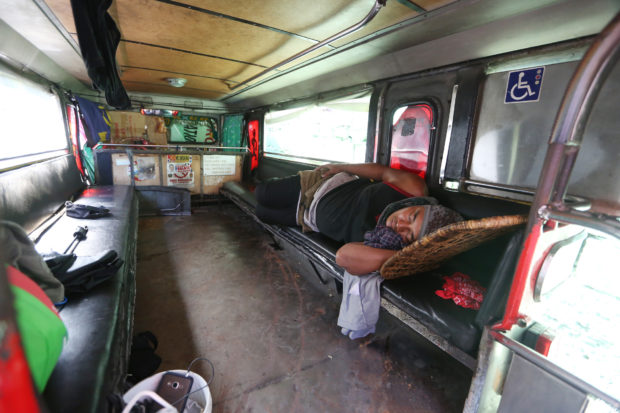
APPEAL FOR HELP A jeepney driver in Quezon City who has lost his livelihood with the suspension of public transportation due to the lockdown in Metro Manila takes a nap in his vehicle on Monday. A sign is posted on its windshield asking for financial assistance. —NIÑO JESUS ORBETA
MANILA, Philippines — Every P200-billion cut in the infrastructure budget could mean the loss of almost half a million jobs, the chair of a key House committee said on Monday as he urged the government not to sacrifice projects like roads and bridges in the hunt for extra funding to respond to the coronavirus pandemic.
Rep. Joey Salceda, who heads the House ways and means committee, made the call amid a brewing feud between House leaders and the Department of Budget and Management (DBM) over discontinuing infrastructure projects to raise funds for fighting the coronavirus.
The plan sparked objections from lawmakers whose districts would be affected.
“We estimate that every P200 billion in infrastructure can create up to 463,000 jobs [during] the year it is spent. Conversely, since the government is now the sole driving force of demand, a P200-billion cut in infra will cost 463,000 jobs,” Salceda said in a policy paper he shared with reporters.
The Albay lawmaker proposed the inclusion of an “enhanced Build, Build, Build” program in the array of economic stimulus strategies to be employed by the government in response to the coronavirus.
Stimulus tools
“Infrastructure remains one of the most powerful economic stimulus tools — especially if you can finish it on time,” Salceda said.
He reiterated his push for the passage of a law granting the President special powers to expedite the Build, Build, Build program.
In a separate statement, Anakalusugan Rep. Michael Defensor, chair of the House public accounts panel, echoed Speaker Alan Peter Cayetano’s call for “full transparency” in the implementation of austerity measures to raise funds in the fight against COVID-19, the disease caused by the new coronavirus.
He said the DBM and concerned agencies could come up with a consolidated list of affected projects and post them on their websites.
DBM circular
“That way, people will know if a funded program, activity or project would no longer be undertaken. At least, they would not expect it to materialize this year,” Defensor said.
Last week, the DBM imposed a 35-percent reduction on “programmed appropriations” for 2020 and an additional 10 percent mandatory saving on nonessential expenditure.
The circular drew rebuke from Cayetano, who questioned whether Budget Secretary Wendel Avisado was making the right calls on which projects to discontinue.
Cayetano told reporters that while he understood that the need for austerity measures and certain infrastructure projects could be delayed, there were others that should not be postponed, such as roads and bridges.
“For instance, an ongoing multiyear bridge construction, you should not touch the funds for it. Implementation has to continue,” he said.
In March, Congress passed a law allowing the President to discontinue projects and realign items in the 2019 and 2020 budget for COVID-19.
Members of the economic team, however, said they were running out of funds, considering that the government had already spent P352.7 billion out of the P397-billion budget allocated by Congress for the COVID-19 response.
Most of the funding went to the government’s social amelioration program for 18 million poor families, cash assistance to workers in the formal sector and overseas Filipino workers, a wage subsidy program for employees of small businesses, as well as procurement of medical supplies, equipment and medicines for COVID-19 patients and health-care workers.
Presidential spokesperson Harry Roque said the government still had funding to cover the extension of the enhanced community quarantine but only until May 15. He noted that Congress gave a budget good for two months.
Reviewing ‘uncommitted’ fundsThe government is reviewing the 2020 national budget for “uncommitted” funds that can be used to augment its existing budget for its fight against the new coronavirus crisis, according to Roque.
He said Avisado had given the different offices until April 30 to report which allocations could be used to battle the health threat.
“After April 30, we will have a better picture of just how much we can realign,” Roque said in a press briefing.
He explained that should the identified uncommitted funds be not enough, the executive branch would ask for a supplemental budget from Congress.
“If it is still not enough even with the realignment of funds, that’s when we will ask for a supplemental budget,” Roque said
He said the DBM had identified a total of P77 billion in unreleased funds from the 2019 national budget.
“As you can see, the budget for COVID-19 is about to run out. That is why we need to go back to Congress. Even if we have money in our coffers, we cannot spend it without Congress’ authorization,” Roque said.
As for questionable “pork insertions,” Roque said Malacañang was leaving it to line agencies to decide whether to realign these funds for the COVID-19 response.
He was responding to the call of Sen. Panfilo Lacson that the government consider diverting P84 billion in pork insertions of lawmakers in the P4.1-trillion 2020 national budget, which were lodged in the Department of Public Works and Highways, and the Department of Transportation.